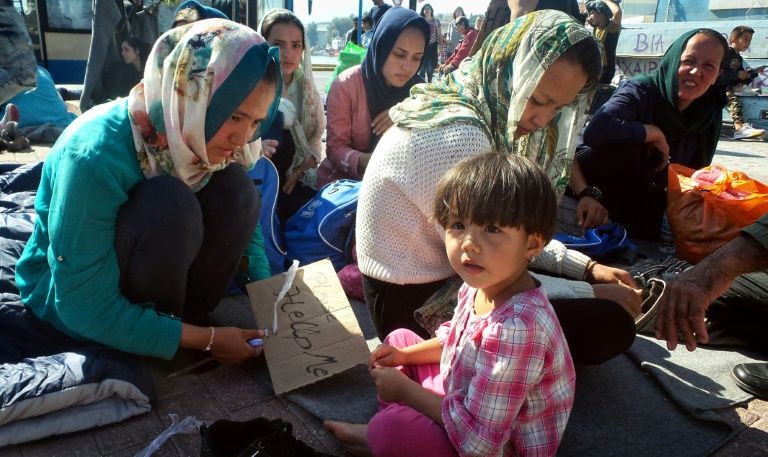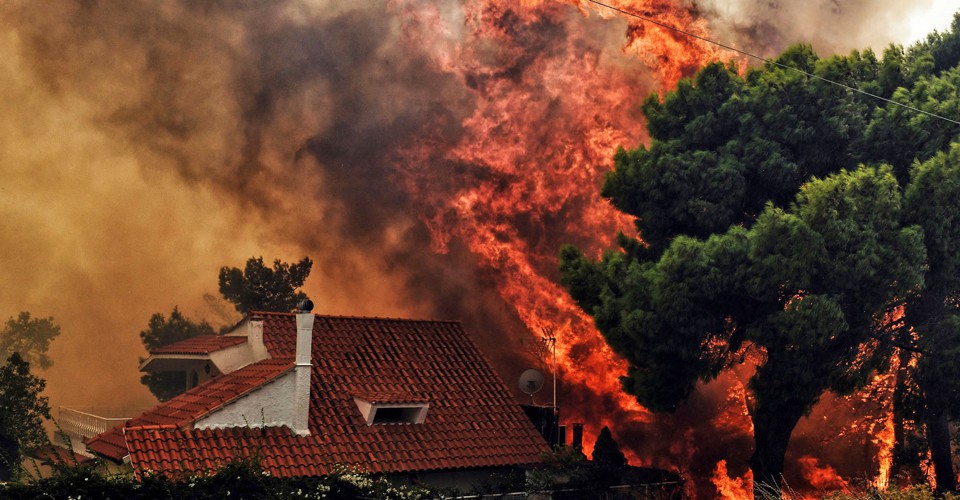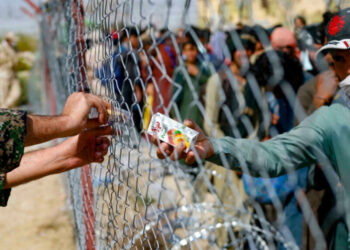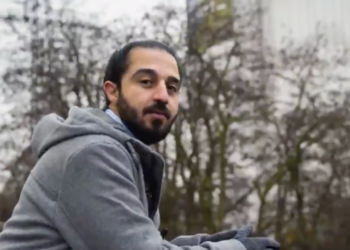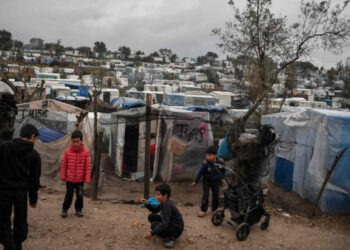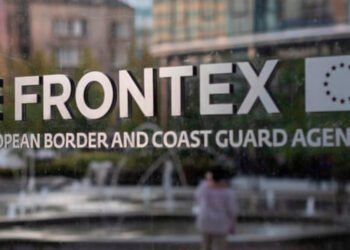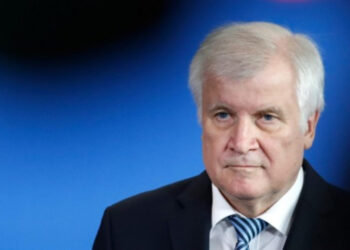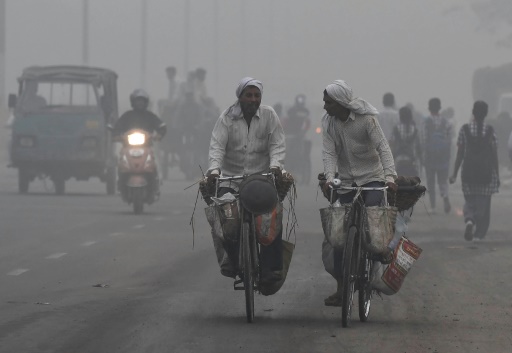When thousands of people fleeing war and poverty began arriving on their Greek island, many on Lesbos welcomed them. Four years later a sprawling local camp is packed with desperate asylum-seekers and migrants – and islanders’ patience is wearing thin.
In the small village of Moria, local people living next to one of the region’s largest migrant camps have grown tired of their role at the center of Europe’s migration crisis, while those trapped inside despair of overcrowded conditions and the long wait for asylum.
“There’s a great indignation among locals. Europe must understand this burden, Greece shouldn’t lift it by itself, it should be shared, every state must take its part,” said Nikos Trakellis, Moria village chairman.
He said it was as yet unclear how the issue would affect voting in local and European elections in May, with fears that the far-right could capitalize on anti-immigration sentiment across the bloc.
“There are issues every day … all their sewage, the dirt we breathe it,” he said, accusing migrants from the camps of stealing livestock and food.
At around 7,000, refugees and migrants on Lesbos currently outnumber the local population by 2.5 to one. According to the U.N. refugee agency UNHCR, the situation is even more explosive on the island of Samos, at six to one.
But it’s not as if the migrants and refugees want to stay on Lesbos.
Ibrahim Adamou, a 27-year-old from Togo, spent six months in the Moria camp, witnessing “disgusting” conditions and sleeping “on the ground, in the cold.” He has been offered an asylum hearing in October.
Search for Freedom
“Europe must not disappoint us,” said Lesbos’ outgoing mayor Spyros Galinos.
“We are still waiting for pressure on the Moria camp to be lifted. They keep coming and this creates a bottleneck,” he told AFP.
Most migrants want to move on to wealthier E.U. states such as Germany and France to rejoin relatives and find work unavailable in crisis-hit Greece. But E.U. borders have been closed for the past three years.
Both economic migrants and war refugees register for asylum regardless of their chances of success, clogging the system.
“I thought I would find freedom in Europe,” said Mohamed from Syria.
He said he has been trapped on Lesbos for three years.
Three years after the EU-Turkey 'Deal' refugees are again 'housed' in tents in mainland Greece. After Skaramangas, now Nea Kavala…#stopthetoxicdeal pic.twitter.com/dqbftafo4P
— RSA (@rspaegean) April 1, 2019
The camp’s deputy commander Dimitrios Vafeas admitted “there’s a huge waiting list” to process claims.
“We have arrivals every day, 90 percent of them Afghans. It’s important to continue accelerating the transfers to the mainland,” he told AFP.
The government has already transferred hundreds of the most vulnerable refugees to camps elsewhere in Greece. They are replaced within days by new arrivals.
Living under such confined conditions further saps the fragile health of camp residents.
Caroline Willemen, Lesbos coordinator for Doctors Without Borders (MSF), said people suffered ailments associated with poor hygiene, diarrhea, respiratory problems, and mental illness.
Most people at the camp meet the criteria for resettlement in other E.U. countries, argued Stratis Skountianellis, a lawyer specializing in refugee cases.
In the past, people would only stay on the islands for a maximum of two days, according to UNHCR’s representative in Greece, Philippe Leclerc.
“But the slow workings of Greek bureaucracy, and pressure by certain E.U. member states to keep migrants on the islands, have created overpopulation and suffering on both sides,” he said.
‘Like a Cyclone’
Trakellis, the Moria village leader, said the 2015 crisis hit “like a cyclone.”
“Wherever you looked, there were refugees and migrants. Yes, we welcomed them but how long can you last? People are tired.”
According to E.U. border agency Frontex, Greece in 2019 registered some 5,500 migrant and refugee arrivals in the first two months of the year, just behind Spain. That number is a third higher than the 2018 equivalent.
Current arrivals are nothing compared to the million people that crossed over to Europe in 2015, most fleeing war in Syria, followed by Iraqis and Afghans.
“Over 875,000 migrants arrived on the Greek islands in 2015,” said Frontex spokeswoman Ewa Moncure. This fell to 56,500 last year, just behind Spain at 57,000. Italy, led by a populist government vehemently opposing migration, was a distant third at 23,000.
George Manoussos, a crew member on a Greek coast guard patrol boat, was on duty at the height of the crisis.
“Many thousands of people arrived, by day or by night. We were seeing dots everywhere on our radar … sometimes we had to choose between eight boats,” he told AFP.
“Every boat is a potential shipwreck,” said Manoussos, who is still haunted by the memory of dead children plucked from the sea.
Mountains of discarded lifejackets – too poorly made to be of use in a real emergency – are a poignant reminder of the risks the migrants and refugees took to get this far.
Manoussos noted that there are fewer sinkings now, after a 2016 E.U.-Turkey deal to stem the flow of arrivals, in addition to beefed-up patrols by NATO and Frontex.
Intolerance Rising
As the situation grinds on intolerance has increased.
“We feel that Europeans forgot about the refugees. This policy allows people to become more xenophobic, racist, it is frightening,” said Efi Latsoudi, member of local support group Lesvos Solidarity.
Last April, Afghan families protesting about living conditions in the camp were assaulted by far-right militants throwing stones and flares.
A monument erected to drowned migrants has also been repeatedly vandalised.
“People feel betrayed by Europe, the richest northern European countries don’t accept refugees,” adds Lena Altinoglou, owner of a Lesbos restaurant employing migrants.
“They want to turn our island into a concentration camp,” she argues.
More on the Subject
Millions of refugees – mostly from Syria – have poured into Turkey since the outset of its Southern neighbor’s bloody civil war in 2011.
And though the war appears to be winding towards a conclusion, some 3.5 million refugees remain in Turkish territory today, the largest refugee population of any country on Earth.
Those who remain there face bleak living conditions and an uncertain future, particularly as far-right, anti-migrant political parties have gained influence across Europe.


